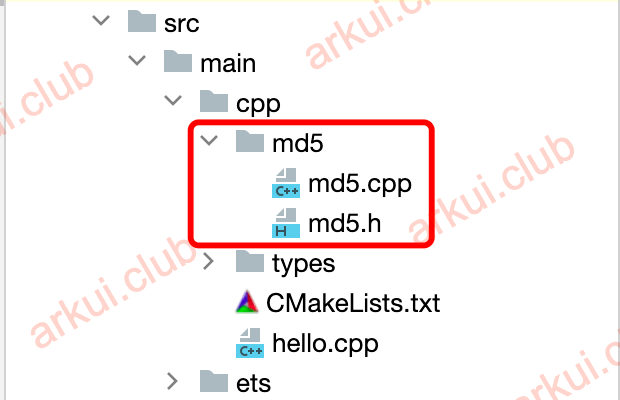# 16.5:引入三方库
笔者在第 4 小节里基于前 3 小结的知识点简单扩展了一个 md5() 方法并成功在 JS 代码里调起了 C++ 代码,本节笔者简单介绍一下引入三方库编译的知识点。
# 16.5.1:引入MD5源码
上一小节的 md5() 方法实现只是简单模拟,并没有真正实现 MD5 的计算,因此笔者从网上找了一个 MD5 计算的源码并引入工程,工程目录如下所示:

其中 md5.h 源码如下所示:
//
// Created on 2023/2/28.
//
// Node APIs are not fully supported. To solve the compilation error of the interface cannot be found,
// please include "napi/native_api.h".
#ifndef oh_0400_napi_md5_H
#define oh_0400_napi_md5_H
/* Parameters of MD5. */
#define s11 7
#define s12 12
#define s13 17
#define s14 22
#define s21 5
#define s22 9
#define s23 14
#define s24 20
#define s31 4
#define s32 11
#define s33 16
#define s34 23
#define s41 6
#define s42 10
#define s43 15
#define s44 21
#define F(x, y, z) (((x) & (y)) | ((~x) & (z)))
#define G(x, y, z) (((x) & (z)) | ((y) & (~z)))
#define H(x, y, z) ((x) ^ (y) ^ (z))
#define I(x, y, z) ((y) ^ ((x) | (~z)))
#define ROTATELEFT(num, n) (((num) << (n)) | ((num) >> (32-(n))))
#define FF(a, b, c, d, x, s, ac) { \
(a) += F ((b), (c), (d)) + (x) + ac; \
(a) = ROTATELEFT ((a), (s)); \
(a) += (b); \
}
#define GG(a, b, c, d, x, s, ac) { \
(a) += G ((b), (c), (d)) + (x) + ac; \
(a) = ROTATELEFT ((a), (s)); \
(a) += (b); \
}
#define HH(a, b, c, d, x, s, ac) { \
(a) += H ((b), (c), (d)) + (x) + ac; \
(a) = ROTATELEFT ((a), (s)); \
(a) += (b); \
}
#define II(a, b, c, d, x, s, ac) { \
(a) += I ((b), (c), (d)) + (x) + ac; \
(a) = ROTATELEFT ((a), (s)); \
(a) += (b); \
}
#include <string>
#include <cstring>
using std::string;
/* Define of btye.*/
typedef unsigned char byte;
/* Define of byte. */
typedef unsigned int bit32;
class MD5 {
public:
/* Construct a MD5 object with a string. */
MD5(const string& message);
/* Generate md5 digest. */
const byte* getDigest();
/* Convert digest to string value */
string toStr();
private:
/* Initialization the md5 object, processing another message block,
* and updating the context.*/
void init(const byte* input, size_t len);
/* MD5 basic transformation. Transforms state based on block. */
void transform(const byte block[64]);
/* Encodes input (usigned long) into output (byte). */
void encode(const bit32* input, byte* output, size_t length);
/* Decodes input (byte) into output (usigned long). */
void decode(const byte* input, bit32* output, size_t length);
private:
/* Flag for mark whether calculate finished. */
bool finished;
/* state (ABCD). */
bit32 state[4];
/* number of bits, low-order word first. */
bit32 count[2];
/* input buffer. */
byte buffer[64];
/* message digest. */
byte digest[16];
/* padding for calculate. */
static const byte PADDING[64];
/* Hex numbers. */
static const char HEX_NUMBERS[16];
};
#endif //oh_0400_napi_md5_H
1
2
3
4
5
6
7
8
9
10
11
12
13
14
15
16
17
18
19
20
21
22
23
24
25
26
27
28
29
30
31
32
33
34
35
36
37
38
39
40
41
42
43
44
45
46
47
48
49
50
51
52
53
54
55
56
57
58
59
60
61
62
63
64
65
66
67
68
69
70
71
72
73
74
75
76
77
78
79
80
81
82
83
84
85
86
87
88
89
90
91
92
93
94
95
96
97
98
99
100
101
102
103
104
105
106
107
108
109
110
111
112
113
114
115
116
117
2
3
4
5
6
7
8
9
10
11
12
13
14
15
16
17
18
19
20
21
22
23
24
25
26
27
28
29
30
31
32
33
34
35
36
37
38
39
40
41
42
43
44
45
46
47
48
49
50
51
52
53
54
55
56
57
58
59
60
61
62
63
64
65
66
67
68
69
70
71
72
73
74
75
76
77
78
79
80
81
82
83
84
85
86
87
88
89
90
91
92
93
94
95
96
97
98
99
100
101
102
103
104
105
106
107
108
109
110
111
112
113
114
115
116
117
md5.cpp 源码如下所示:
//
// Created on 2023/2/28.
//
// Node APIs are not fully supported. To solve the compilation error of the interface cannot be found,
// please include "napi/native_api.h".
#include "md5.h"
#include <string>
/* Define the static member of MD5. */
const byte MD5::PADDING[64] = { 0x80 };
const char MD5::HEX_NUMBERS[16] = {
'0', '1', '2', '3',
'4', '5', '6', '7',
'8', '9', 'a', 'b',
'c', 'd', 'e', 'f'
};
MD5::MD5(const string& message) {
finished = false;
/* Reset number of bits. */
count[0] = count[1] = 0;
/* Initialization constants. */
state[0] = 0x67452301;
state[1] = 0xefcdab89;
state[2] = 0x98badcfe;
state[3] = 0x10325476;
/* Initialization the object according to message. */
init((const byte*)message.c_str(), message.length());
}
/**
* @Generate md5 digest.
*
* @return the message-digest.
*
*/
const byte* MD5::getDigest() {
if (!finished) {
finished = true;
byte bits[8];
bit32 oldState[4];
bit32 oldCount[2];
bit32 index, padLen;
/* Save current state and count. */
memcpy(oldState, state, 16);
memcpy(oldCount, count, 8);
/* Save number of bits */
encode(count, bits, 8);
/* Pad out to 56 mod 64. */
index = (bit32)((count[0] >> 3) & 0x3f);
padLen = (index < 56) ? (56 - index) : (120 - index);
init(PADDING, padLen);
/* Append length (before padding) */
init(bits, 8);
/* Store state in digest */
encode(state, digest, 16);
/* Restore current state and count. */
memcpy(state, oldState, 16);
memcpy(count, oldCount, 8);
}
return digest;
}
/**
* @Initialization the md5 object, processing another message block,
* and updating the context.
*
* @param {input} the input message.
*
* @param {len} the number btye of message.
*
*/
void MD5::init(const byte* input, size_t len) {
bit32 i, index, partLen;
finished = false;
/* Compute number of bytes mod 64 */
index = (bit32)((count[0] >> 3) & 0x3f);
/* update number of bits */
if ((count[0] += ((bit32)len << 3)) < ((bit32)len << 3)) {
++count[1];
}
count[1] += ((bit32)len >> 29);
partLen = 64 - index;
/* transform as many times as possible. */
if (len >= partLen) {
memcpy(&buffer[index], input, partLen);
transform(buffer);
for (i = partLen; i + 63 < len; i += 64) {
transform(&input[i]);
}
index = 0;
} else {
i = 0;
}
/* Buffer remaining input */
memcpy(&buffer[index], &input[i], len - i);
}
void MD5::transform(const byte block[64]) {
bit32 a = state[0], b = state[1], c = state[2], d = state[3], x[16];
decode(block, x, 64);
/* Round 1 */
FF (a, b, c, d, x[ 0], s11, 0xd76aa478);
FF (d, a, b, c, x[ 1], s12, 0xe8c7b756);
FF (c, d, a, b, x[ 2], s13, 0x242070db);
FF (b, c, d, a, x[ 3], s14, 0xc1bdceee);
FF (a, b, c, d, x[ 4], s11, 0xf57c0faf);
FF (d, a, b, c, x[ 5], s12, 0x4787c62a);
FF (c, d, a, b, x[ 6], s13, 0xa8304613);
FF (b, c, d, a, x[ 7], s14, 0xfd469501);
FF (a, b, c, d, x[ 8], s11, 0x698098d8);
FF (d, a, b, c, x[ 9], s12, 0x8b44f7af);
FF (c, d, a, b, x[10], s13, 0xffff5bb1);
FF (b, c, d, a, x[11], s14, 0x895cd7be);
FF (a, b, c, d, x[12], s11, 0x6b901122);
FF (d, a, b, c, x[13], s12, 0xfd987193);
FF (c, d, a, b, x[14], s13, 0xa679438e);
FF (b, c, d, a, x[15], s14, 0x49b40821);
/* Round 2 */
GG (a, b, c, d, x[ 1], s21, 0xf61e2562);
GG (d, a, b, c, x[ 6], s22, 0xc040b340);
GG (c, d, a, b, x[11], s23, 0x265e5a51);
GG (b, c, d, a, x[ 0], s24, 0xe9b6c7aa);
GG (a, b, c, d, x[ 5], s21, 0xd62f105d);
GG (d, a, b, c, x[10], s22, 0x2441453);
GG (c, d, a, b, x[15], s23, 0xd8a1e681);
GG (b, c, d, a, x[ 4], s24, 0xe7d3fbc8);
GG (a, b, c, d, x[ 9], s21, 0x21e1cde6);
GG (d, a, b, c, x[14], s22, 0xc33707d6);
GG (c, d, a, b, x[ 3], s23, 0xf4d50d87);
GG (b, c, d, a, x[ 8], s24, 0x455a14ed);
GG (a, b, c, d, x[13], s21, 0xa9e3e905);
GG (d, a, b, c, x[ 2], s22, 0xfcefa3f8);
GG (c, d, a, b, x[ 7], s23, 0x676f02d9);
GG (b, c, d, a, x[12], s24, 0x8d2a4c8a);
/* Round 3 */
HH (a, b, c, d, x[ 5], s31, 0xfffa3942);
HH (d, a, b, c, x[ 8], s32, 0x8771f681);
HH (c, d, a, b, x[11], s33, 0x6d9d6122);
HH (b, c, d, a, x[14], s34, 0xfde5380c);
HH (a, b, c, d, x[ 1], s31, 0xa4beea44);
HH (d, a, b, c, x[ 4], s32, 0x4bdecfa9);
HH (c, d, a, b, x[ 7], s33, 0xf6bb4b60);
HH (b, c, d, a, x[10], s34, 0xbebfbc70);
HH (a, b, c, d, x[13], s31, 0x289b7ec6);
HH (d, a, b, c, x[ 0], s32, 0xeaa127fa);
HH (c, d, a, b, x[ 3], s33, 0xd4ef3085);
HH (b, c, d, a, x[ 6], s34, 0x4881d05);
HH (a, b, c, d, x[ 9], s31, 0xd9d4d039);
HH (d, a, b, c, x[12], s32, 0xe6db99e5);
HH (c, d, a, b, x[15], s33, 0x1fa27cf8);
HH (b, c, d, a, x[ 2], s34, 0xc4ac5665);
/* Round 4 */
II (a, b, c, d, x[ 0], s41, 0xf4292244);
II (d, a, b, c, x[ 7], s42, 0x432aff97);
II (c, d, a, b, x[14], s43, 0xab9423a7);
II (b, c, d, a, x[ 5], s44, 0xfc93a039);
II (a, b, c, d, x[12], s41, 0x655b59c3);
II (d, a, b, c, x[ 3], s42, 0x8f0ccc92);
II (c, d, a, b, x[10], s43, 0xffeff47d);
II (b, c, d, a, x[ 1], s44, 0x85845dd1);
II (a, b, c, d, x[ 8], s41, 0x6fa87e4f);
II (d, a, b, c, x[15], s42, 0xfe2ce6e0);
II (c, d, a, b, x[ 6], s43, 0xa3014314);
II (b, c, d, a, x[13], s44, 0x4e0811a1);
II (a, b, c, d, x[ 4], s41, 0xf7537e82);
II (d, a, b, c, x[11], s42, 0xbd3af235);
II (c, d, a, b, x[ 2], s43, 0x2ad7d2bb);
II (b, c, d, a, x[ 9], s44, 0xeb86d391);
state[0] += a;
state[1] += b;
state[2] += c;
state[3] += d;
}
/**
* @Encodes input (unsigned long) into output (byte).
*
* @param {input} usigned long.
*
* @param {output} byte.
*
* @param {length} the length of input.
*
*/
void MD5::encode(const bit32* input, byte* output, size_t length) {
for (size_t i = 0, j = 0; j < length; ++i, j += 4) {
output[j]= (byte)(input[i] & 0xff);
output[j + 1] = (byte)((input[i] >> 8) & 0xff);
output[j + 2] = (byte)((input[i] >> 16) & 0xff);
output[j + 3] = (byte)((input[i] >> 24) & 0xff);
}
}
/**
* @Decodes input (byte) into output (usigned long).
*
* @param {input} bytes.
*
* @param {output} unsigned long.
*
* @param {length} the length of input.
*
*/
void MD5::decode(const byte* input, bit32* output, size_t length) {
for (size_t i = 0, j = 0; j < length; ++i, j += 4) {
output[i] = ((bit32)input[j]) | (((bit32)input[j + 1]) << 8) |
(((bit32)input[j + 2]) << 16) | (((bit32)input[j + 3]) << 24);
}
}
/**
* @Convert digest to string value.
*
* @return the hex string of digest.
*
*/
string MD5::toStr() {
const byte* digest_ = getDigest();
string str;
str.reserve(16 << 1);
for (size_t i = 0; i < 16; ++i) {
int t = digest_[i];
int a = t / 16;
int b = t % 16;
str.append(1, HEX_NUMBERS[a]);
str.append(1, HEX_NUMBERS[b]);
}
return str;
}
1
2
3
4
5
6
7
8
9
10
11
12
13
14
15
16
17
18
19
20
21
22
23
24
25
26
27
28
29
30
31
32
33
34
35
36
37
38
39
40
41
42
43
44
45
46
47
48
49
50
51
52
53
54
55
56
57
58
59
60
61
62
63
64
65
66
67
68
69
70
71
72
73
74
75
76
77
78
79
80
81
82
83
84
85
86
87
88
89
90
91
92
93
94
95
96
97
98
99
100
101
102
103
104
105
106
107
108
109
110
111
112
113
114
115
116
117
118
119
120
121
122
123
124
125
126
127
128
129
130
131
132
133
134
135
136
137
138
139
140
141
142
143
144
145
146
147
148
149
150
151
152
153
154
155
156
157
158
159
160
161
162
163
164
165
166
167
168
169
170
171
172
173
174
175
176
177
178
179
180
181
182
183
184
185
186
187
188
189
190
191
192
193
194
195
196
197
198
199
200
201
202
203
204
205
206
207
208
209
210
211
212
213
214
215
216
217
218
219
220
221
222
223
224
225
226
227
228
229
230
231
232
233
234
235
236
237
238
239
240
241
242
243
244
245
246
247
248
249
250
251
252
253
254
255
256
257
258
259
260
2
3
4
5
6
7
8
9
10
11
12
13
14
15
16
17
18
19
20
21
22
23
24
25
26
27
28
29
30
31
32
33
34
35
36
37
38
39
40
41
42
43
44
45
46
47
48
49
50
51
52
53
54
55
56
57
58
59
60
61
62
63
64
65
66
67
68
69
70
71
72
73
74
75
76
77
78
79
80
81
82
83
84
85
86
87
88
89
90
91
92
93
94
95
96
97
98
99
100
101
102
103
104
105
106
107
108
109
110
111
112
113
114
115
116
117
118
119
120
121
122
123
124
125
126
127
128
129
130
131
132
133
134
135
136
137
138
139
140
141
142
143
144
145
146
147
148
149
150
151
152
153
154
155
156
157
158
159
160
161
162
163
164
165
166
167
168
169
170
171
172
173
174
175
176
177
178
179
180
181
182
183
184
185
186
187
188
189
190
191
192
193
194
195
196
197
198
199
200
201
202
203
204
205
206
207
208
209
210
211
212
213
214
215
216
217
218
219
220
221
222
223
224
225
226
227
228
229
230
231
232
233
234
235
236
237
238
239
240
241
242
243
244
245
246
247
248
249
250
251
252
253
254
255
256
257
258
259
260
# 16.5.2:使用MD5算法
引入 MD5 算法后,就可以在 hello.cpp 里的 Md5() 方法内实现 MD5 算法了,使用流程如下:
引入头文件
引入头文件的目的是调用其提供的 MD5 计算方法,和 JS 里的
import功能类似。#include "./md5/md5.h"1使用md5算法
修改 hello.cpp 里的
Md5()方法内容如下所示:static napi_value Md5(napi_env env, napi_callback_info info) { // 1、从info中取出JS传递过来的参数放入args size_t argc = 1; napi_value args[1] = { nullptr }; if (napi_ok != napi_get_cb_info(env, info, &argc, args, nullptr, nullptr)) { napi_throw_error(env, "-1000", "napi_get_cb_info error"); return nullptr; } // 2、获取参数的类型 napi_valuetype stringType; if (napi_ok != napi_typeof(env, args[0], &stringType)) { napi_throw_error(env, "-1001", "napi_typeof error"); return nullptr; } // 3、如果参数为null,这抛异常 if (napi_null == stringType) { napi_throw_error(env, "-1002", "the param can't be null"); return nullptr; } // 4、获取传递的string长度 size_t length = 0; if (napi_ok != napi_get_value_string_utf8(env, args[0], nullptr, 0, &length)) { napi_throw_error(env, "-1003", "napi_get_value_string_utf8 error"); return nullptr; } // 5、如果传递的是"",则抛异常 if (length == 0) { napi_throw_error(env, "-1004", "the param length invalid"); return nullptr; } // 6、读取传递的string参数放入buffer中 char* buffer = new char[length + 1]; if (napi_ok != napi_get_value_string_utf8(env, args[0], buffer, length + 1, &length)) { delete[] buffer; buffer = nullptr; napi_throw_error(env, "-1005", "napi_get_value_string_utf8 error"); return nullptr; } // ********************************************************************** // ********************************MD5加密******************************** // 7、计算MD5加密操作 std::string str = buffer; // MD5 加密计算 str = MD5(str).toStr(); // ********************************************************************** // ********************************MD5加密******************************** // 8、把C++数据转成napi_value并返回 napi_value value = nullptr; const char* md5 = str.c_str(); if (napi_ok != napi_create_string_utf8(env, md5, strlen(md5), &value)) { delete[] buffer; buffer = nullptr; napi_throw_error(env, "-1006", "napi_create_string_utf8 error"); return nullptr; } // 9、资源清理 delete[] buffer; buffer = nullptr; return value; }1
2
3
4
5
6
7
8
9
10
11
12
13
14
15
16
17
18
19
20
21
22
23
24
25
26
27
28
29
30
31
32
33
34
35
36
37
38
39
40
41
42
43
44
45
46
47
48
49
50
51
52
53
54
55
56
57
58
59
60
61
62
63
64
65
66
67
68
69
70
71
72
73主要看第 7 步:直接创建 MD5 后调用其
toStr()方法即可生成加密后的字符串。
# 16.5.3:修改CMake文件
增加了 MD5 计算的源码,需要修改 CMakeLists.txt 文件,目的是把计算 MD5 的源文件打包进 so 中,修改后的代码如下所示:
# the minimum version of CMake.
cmake_minimum_required(VERSION 3.4.1)
project(oh_0400_napi)
set(NATIVERENDER_ROOT_PATH ${CMAKE_CURRENT_SOURCE_DIR})
include_directories(${NATIVERENDER_ROOT_PATH}
${NATIVERENDER_ROOT_PATH}/include)
# 把 md5.cpp 源文件引入
add_library(entry SHARED hello.cpp ./md5/md5.cpp)
target_link_libraries(entry PUBLIC libace_napi.z.so)
1
2
3
4
5
6
7
8
9
10
11
12
13
2
3
4
5
6
7
8
9
10
11
12
13
# 16.5.4:测试MD5算法
根据 Md5() 方法的实现,限制条件是不允许数据 null 和 "",如果输入则抛异常。因此可测试以下三种场景:正常参数,null 参数和 "" 参数,样例代码如下所示:
import testNapi from 'libentry.so'
@Entry @Component struct Index {
@State message: string = 'Hello,OpenHarmony'
build() {
Column({space: 10}) {
Text(this.message)
.fontSize(20)
Button("正常参数")
.onClick(() => {
this.message = testNapi.md5("Hello, OpenHarmony")
})
Button("null参数")
.onClick(() => {
this.message = testNapi.md5(null);
})
Button("\"\"参数")
.onClick(() => {
this.message = testNapi.md5("");
})
}
.padding(10)
.width('100%')
.height("100%")
}
}
1
2
3
4
5
6
7
8
9
10
11
12
13
14
15
16
17
18
19
20
21
22
23
24
25
26
27
28
29
30
31
32
2
3
4
5
6
7
8
9
10
11
12
13
14
15
16
17
18
19
20
21
22
23
24
25
26
27
28
29
30
31
32
点解 正常参数 按钮,输出结果和在线网站上计算的结果一致,非常棒(#^.^#),样例运行结果如下所示:

# 16.5.5:小结
本节笔者通过引入三方库的方式实现了 MD5 的计算,当前只是一个简单的计算,如果是一个非常复杂的耗时计算,就会阻塞主线程,因此需要实现异步方法,笔者将要在下节讲解一下异步的实现方式。

请作者喝杯咖啡
©arkui.club版权所有,禁止私自转发、克隆网站。
